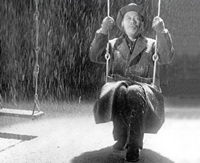Is It Really a Great Movie? Part Thirty-Six: Ikiru
by dan heaton
Using Roger Ebert's Great Movies book as a guide, this series of articles will focus on all films included on his list that previously have escaped my notice. Since all lists are subjective, I am not treating Ebert's choices as the essential selection of films. However, his essays offer the perfect chance for me to explore both classics and lesser-known pictures from around the globe.

Akira Kurosawa is arguably the most famous Japanese director here in the States and is frequently studied by both experts and film students. The long-time filmmaker is well known for such classics as Rashomon (1950), The Seven Samurai (1954), Yojimbo (1960) and many others. Kurosawa continued to direct films into the early 1990s before succumbing to a stroke in 1998. His directing approach involved unique tactics supporting his perfectionist style. Although it’s not as widely recognized as Kurosawa’s other films, Ikiru (1952) has received considerable accolades from critics and viewers. It earned Best Film at Japan’s Kinema Junpo Awards, and star Takashi Shimura was nominated for a BAFTA award as Best Foreign Actor in 1960.
I’ve enjoyed several Kurosawa films in the past, but did not have much enthusiasm before viewing this picture. The subject matter of a bureaucrat dying of stomach cancer did not seem to be exciting material. However, the high praise from critics and friends raised my expectations. Shimura plays the old guy — Kanji Watanabe — who spends his days shuffling papers and serving the government machine. Nothing positive seems to occur, and everyone follows their superiors’ instructions without question. He leads a dreary existence and doesn’t relate well to his son and daughter-in-law. Watanabe’s discovery of his stomach cancer is a sad moment, and we appear headed towards a depressing conclusion. Thankfully, Kurosawa and co-writer Shinobu Hashimoto have different ideas and show Watanabe’s attempts to enjoy life before he expires. He goes out partying with young, exciting girls and even grows attached to one of them, but still feels unfulfilled by the experience.
The title translates as “To Live,” which reveals the film’s predominant themes. But we spend much of the lengthy running time watching Shimura look sad and hunched over. Numerous close-ups reveal his melancholy mood, and the story grinds along at a deliberate pace. The lead actor is trying so hard to appear grim that it nearly approaches comical territory. Even the most deftly composed sequences lose steam as we’re stuck with such a depressing individual. There is a saving grace in the final act, which slightly pulls the rug out from under us and leaps past the expected moments. Incorporating flashbacks to reveal Watanabe’s transformation, Kurosawa brings a surprising poignancy to his plight. The uncaring attempts by the high-level bureaucrats to dismiss his role in a new park showcase the frustrating aspects of the bureaucratic system. The conclusion makes us care deeply for the old man while growing angered over his callous associates.
Roger Ebert calls Ikiru “one of the few movies that might actually be able to inspire someone to lead his or lead a little differently.” It’s difficult for me to argue with this assessment, though I’m not sure that places it among the Great Movies. Watanabe’s final scene is highly memorable and concludes his story on a surprisingly high note. In one sense, the story of death becomes a positive fable of life’s possibilities, which is something I can always appreciate. The drawback for me is the lengthy first half, which didn’t grab me nearly as much as the ending. The finale does bring added relevance to the early scenes, but it falls a little short of delivering a Great Movie. I would recommend this film to pretty much anyone, with the message to stick it out for the rewarding end.
Check out the entire series of "Is It Really a Great Movie?" articles here.
Copyright (c) 2007 erasing clouds |
|